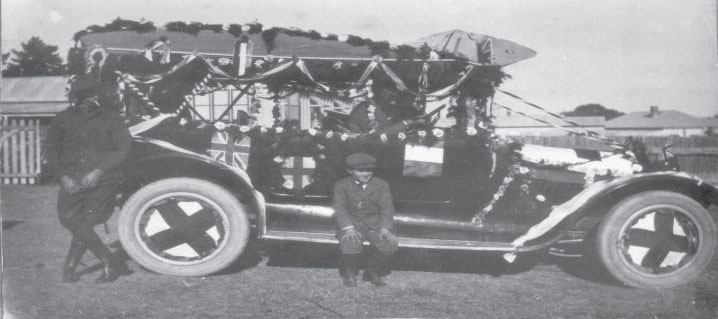Mrs Helena Grace White MBE
by Dr Olav Muurlink
Helena (‘Lena’) Grace White (nee Goodrich) was a stalwart of the Stanthorpe community, married to C.F. White of Pikedale Station, she can take credit for marking the pages of Australian history. Well before the war, the high country had been singled out as a likely site for sanatoria. Until the First World War came, tuberculosis appeared to have been beaten as a major scourge. It had ravaged Europe for three centuries from the sixteenth to the 18th century, with estimates of its toll stretching close to the billion souls (Murray, 2015). By the time 1914 ticked around, the disease had been decreasing steadily until 1914, but suddenly, tuberculosis was back with a vengeance. While rumours linked the sudden escalation to poison gas and malnourishment, the likely cause of the sudden rise was the absence of decent medical care due to resources being turned to the war effort. The effort of volunteers such as Mrs White were critical in reversing that resource shortage, and as president of the Stanthorpe Red Cross branch, she was instrumental in suppling Red Cross support to the Kyoomba Sanatorium for twenty years while it was operated by the Military.
Before the sanatorium had become a Military facility, Mrs White had not exactly been quiet in the community. The First World War however, brought her talents for making a difference in the community to the fore. Soon-to-be diggers years later, streaming to Brisbane on the rail route through Stanthorpe still remembered Mrs White and her helpers delivering refreshments to the railway carriages when the train stopped in the town of Stanthorpe.
In order to help alleviate the boredom suffered by the soldiers who were inmates at the Kyoomba Sanatorium, Mrs White and her daughter Blanche would make her car available for drives and picnics to surrounding areas, organise concerts, plays, musical mornings, card games and many other pursuits for the men. For the 1919 Peace Day march, she had her car decorated and used in the parade for the Red Cross.

After the war, Moiominda, the White home, hosted numerous fundraisers for local causes, but it was her war-time work that is remembered. Between the wars there was little happening in the world of charitable service that Mrs White did not know about. When in April 1923 an effort was made to form a local branch of the Queensland Country Women’s Association in Stanthorpe, it was not surprising that Mrs White was elected the first president.
She may have been a quiet operator, but it was understood well beyond the border region what she had done, and it was with the strong backing of both district, state and federal executives that she was awarded the Returned Sailor and Soldier’s Imperial League’s (a forebear of the current RSL) certificate of appreciation and gold badge of merit for over 20 years of unselfish and untiring service. She was just the second Queenslander to have gained the honour. She was bestowed with the medal at a gala event at Stanthorpe’s Arcadia Theatre in the shadow of a new wave of global unrest, in 1936. In 1941, the year after the death of her husband, Mrs White was awarded an MBE “for services to the Red Cross and soldiers’ philanthropic movements in the Commonwealth of Australia”. These efforts continued well into the Second World War. During the Second World War, she was president of the Stanthorpe branch of the Women’s National Emergency Legion. She died in Southport at the age of 83, after a long illness. The Daily News described her on her death as an “indefatigable worker for returned soldiers”. Her only son had died during the war, and Mrs White was survived by four daughters.